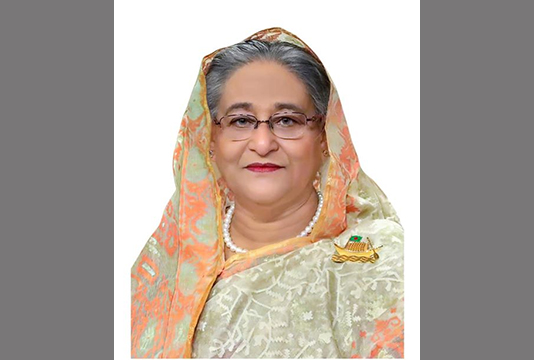DHAKA, Nov 22, 2020 (BSS) – Prime Minister Sheikh Hasina has joined as co-chair of the newly launched One Health Global Leaders Group on Antimicrobial Resistance (AMR) along with other global leaders with a call for increased action to tackle the growing crisis of the antimicrobial resistance.
“Honourable Prime Minister Sheikh Hasina has joined other world leaders to alert countries to the accelerating crisis of antimicrobial resistance (AMR),” said a Food and Agriculture Organisation (FAO) press release here today.
Earlier, Sheikh Hasina and her Barbados counterpart Mia Amor Mottley were made co-chairs of the AMR, a group jointly initiated by World Health Organisation (WHO), FAO and World Organisation for Animal Health (Oie), on Friday last.
Members of the group included heads of government, government ministers, plus leaders from the private sector and civil society.
The group has been created in response to a recommendation from the Interagency Coordination Group on Antimicrobial Resistance and supported by the UN Secretary-General to harness the leadership and influence of world leaders to catalyse global attention and action to avert the disastrous consequences of AMR.
Prime Minister Sheikh Hasina addressed the launching ceremony of the new One Health Global Leaders Group on Antimicrobial Resistance, of which she is co-chair, during World Antimicrobial Awareness Week.
“We are running out of available antibiotics (for antimicrobial resistance) and soon could face another global emergency, far more severe than the current COVID-19 pandemic”, Sheikh Hasina told global leaders at the launch.
She called for increased international coordination and more investment.
According to the press release, antimicrobial resistance arises when the organisms that cause infection evolve ways to survive treatments. Misuse and overuse of antimicrobials in humans, animals and agriculture are the main drivers of AMR.
Resistant micro-organisms can spread between humans, animals or the environment, and the antimicrobials used to treat various infectious diseases in animals and humans can be the same.
One Health is an approach that recognizes that the health of people is closely connected to the health of animals and our shared environment. Resistance is a natural biological phenomenon but is increased and accelerated by various factors such as misuse of medicines, poor infection control practices and global trade and travel.
This is a particular concern with antibiotics. Many of the medical advances in recent years, for example, organ transplantation and cancer chemotherapy, need antibiotics to prevent and treat the bacterial infections that can be caused by the treatment.
Without effective antibiotics, even minor surgery and routine operations could become high-risk procedures if serious infections cannot be treated.
The Directors-General of FAO, OIE and WHO described the rapid rise of drug resistance as one of the world’s most urgent threats to human, animal and environmental health–endangering food security, international trade, economic development and undermining progress towards the Sustainable Development Goals (SDGs).
“During the COVID-19 crisis, we must not forget that AMR is a ‘slow motion’ pandemic, with significant long-term threats to global public health and food security, which needs multi-stakeholders engagement,” said FAO Director-General QU Dongyu.
He added that to accelerate progress in the fight against antimicrobial resistance, FAO was going to launch a new Action Plan on AMR for 2021-2025 aimed at providing further support to governments, producers, traders and other stakeholders for the adoption of measures to minimize the use of antimicrobials and to contain the spread of antimicrobial resistance.
WHO’s latest reporting shows that the world is running out of effective treatments for several common infections.”Antimicrobial resistance is one of the greatest health challenges of this generation, and we absolutely cannot leave it for the next generation to solve,” said Tedros Adhanom Ghebreyesus, Director-General of WHO.
Bangladesh has taken steps to address AMR. In 2017, the country’s leading physicians, veterinarians, and scientists came together to form the Bangladesh AMR Response Alliance (BARA).
BARA practitioners prescribe antimicrobials based on standard guidelines developed together with FAO and WHO, and actively advocate for responsible usage within their workplaces and communities.
Mia Seppo, the UN Resident Coordinator in Bangladesh, welcomed the new high-level coordination group.
“This high-level group is a very important step during a critical time in which antimicrobial resistance is an accelerating crisis. Bangladesh is committed to taking action to tackle this global problem, as evidenced by the commitment of the honourable Prime Minister who is taking a lead role,” Seppo said, adding that the FAO and the WHO will continue to support One Health commitments in Bangladesh.



